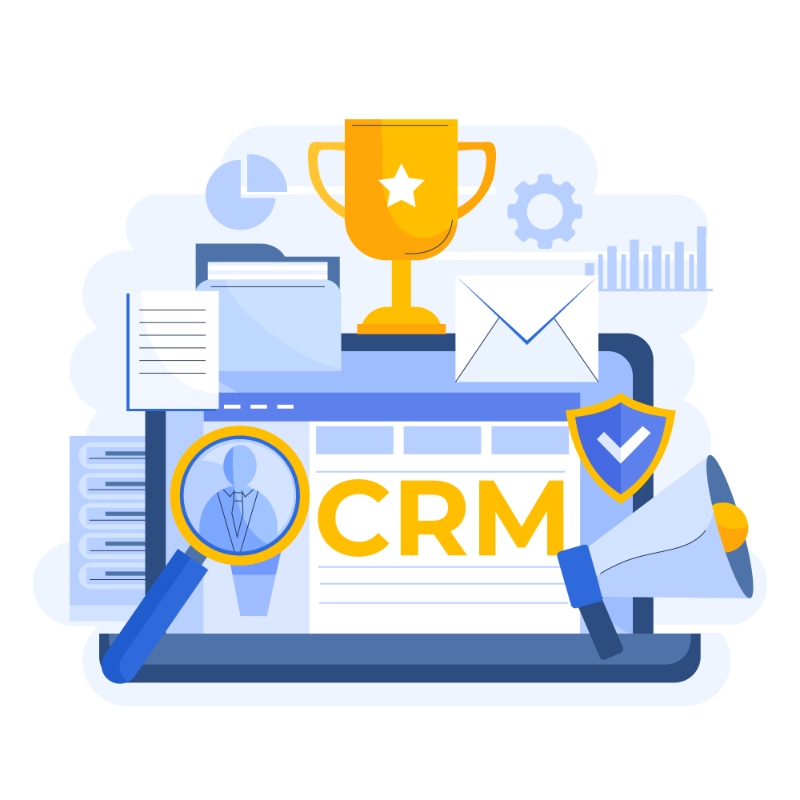CRM Tools Sales People Actually Use (Pros and Cons)
The right tool is out there.
If you follow our blog, you may notice that the headline for this article didn't follow the rest of the series on tools salespeople love to use. No point in guessing why here.
Why are CRM tools so unwieldy? They didn't start out that way, but they got there in time. Little by little, one feature at a time, they grew to become the behemoths they are today. Behemoths that, ultimately, suffer from huge lag times, or don't adhere to your process 'exactly' because your process is different from everyone else (honestly, whose isn't?), or need you to format your inputs just so, or spits out data that you don't need in dashboards you don't use.
In one of my previous organizations, we used to joke that our CRM tool needed a CRM tool. As sales reps and sales engineers and account execs, we were spending so much time just doing busy work that our CRM was becoming more of a hindrance than a help. We began to invent ways to circumvent it, and over a period of time, most of our communication with our customers was primarily over email, the phone and chat. As you can imagine, that resulted in many broken promises, as there was no single source of truth.
SaaS can do it faster (also, in some cases, better)
Especially when you're a fledgling startup, you can't afford the CAPEX on a CRM behemoth. Also, it's overkill. You're not going to use all those features anyway, and the ones you'll want won't be included in the 'basic' package. So, why bother?
SaaS tools, on the other hand, cover every scenario under the sun, and those they don't, they customize for. True, SaaS CRM tools are pricier than, say, SaaS email tracking tools. But they're still MUCH less expensive than your behemoths.
Also, as I always say about SaaS, these tools fight for your business. They know they can't rest on their laurels. They can't relax, because you've already made a long-term commitment. Instead, they're always listening to you. They evolve with your needs because if they don't, someone else will. In fact, someone else will even give you a solution on how to get all the incumbent data into the new system for free.
This brings me to another thing: size. There is a common misnomer that if you're a large organization, your needs are too big to be met by a SaaS CRM tool. That is just flat-out untrue today. Don't take my word for it, just look through the client list of the tools in my list below!
Having said that, all the tools I'm looking into right now are for my own SaaS baby SmartCue, so my lens is skewed towards tools that are most suited to small organizations and startups that are yet to achieve scale. However, all these tools are the sort that can scale rapidly with you when you grow.
With these considerations in mind, here's my list. Please bear in mind that this list isn't exhaustive, and I've only included those tools that I or my tribe have used. Also, I've relied on G2.com and Capterra.com for most of the customer reviews.
1. Pipedrive
Free version: NA
Trial version: Yes
Pipedrive is a clean, simple platform that is easy to pick up and use right away. It offers customer support around the clock, which is a huge plus and certainly not typical of most CRM platforms. Other benefits of Pipedrive include email marketing, lead generation, and data analysis. Pipedrive offers a Contacts Timeline that allows you to see a visual history of all calls, emails, and other activities related to any particular contact.
Cons: For non-technical people, integrating with third-party tools can be tricky. The inability to move among contacts in the same list without returning to the main list page is a waste of time.
2. HubSpot CRM
Free version: Yes
Trial version: Yes
HubSpot has a powerful list of features and is incredibly easy to use, making this a great platform. The simplicity of this software makes onboarding easier for your team and therefore reduces the amount of downtime from switching software. Its powerful reporting tools can help you improve efficiency by spotting opportunities to make improvements, such as spending more time on prospecting or adjusting closing techniques. It offers clean, straightforward dashboards to help large teams stay on the same page and stats that are updated in real-time.
HubSpot has email templates and automation to save time when it comes to contacting and following up with customers. If you're sending the same email over and over again, you can turn it into a template and share it with the team, and even automate personalized emails to clients.
Cons: The marketing add-on is quite expensive and the software is geared toward enterprise customers.
3. Agile
Free version: Yes
Trial version: Yes
Agile is great to use and it is the least expensive option on this list. There's a completely free version for up to 10 users that allows you to have 1,000 contacts and companies, custom data fields, appointment scheduling, email tracking, and more. The paid options aren't too expensive either. Agile has a gamification feature, which encourages competition and collaboration within your sales team and hopefully boosts sales in the process.
Cons: It looks outdated and sending mass emails can be glitchy.
4. Vtiger
Free version: Yes
Trial version: Yes
If you’re a sales army of one, Vtiger might be your best choice. This platform streamlines your sales operation and helps you get organized if you’re starting from square one. It’s also got some automation capabilities to save you time so you can focus more on closing sales than manually entering information. And it’s pretty affordable compared to a lot of the other software options out there. Vtiger allows you to click on any opportunity to immediately see information such as expected close dates and related contacts. You will also be able to add notes or attach documents and have conversations with the rest of the team on how to close this deal. You can visualize the opportunity pipeline in real-time via your dashboard.
Cons: The enterprise search tab doesn't always find everything you're looking for so you have to specifically go to contacts or organizations to find them. Also, it does not allow for templates.
5. Zoho CRM
Free version: Yes
Trial version: Yes
Zoho CRM is perfect for small businesses who want a tool that is straightforward and easy for a team to pick up, but also has a lot of customization options so you can mould it to fit your operation. It’s also good for tech novices, using a web-based platform that integrates well with third-party platforms your team is probably already using. It also comes at a lower price than Salesforce, and it boasts a free version. Zoho CRM's workflow automation will update everything anytime someone on your team follows up with a lead or updates a significant field. There are also workflow rules you can set up that trigger actions when certain conditions are met, with up to 10 conditions for each rule.
Cons: While it is customizable, creating customized reports can be a challenge. Limited integrations are possible and support staff is OK at best.
SmartCue's Favorites
At the moment, we're using Zoho CRM - it has been the perfect balance between cost and customisation, and even my trainees get on board quickly, and without extensive training. At SmartCue, doing things smartly is baked into our ethos. We've made a tool that takes no training to adopt and we constantly look for ways to make our UI more intuitive. So when I have to ask my guys to undertake training on a tool, it needs to be worth it.
My newest interns took on the task of making tool walkthroughs and demos for Zoho, using SmartCue. SmartCue, as you may know, multi-tasks as a demo automation tool, and is being used by many of my clients to supplement their training materials. In some cases, my clients have even used it to make train-the-trainer modules for their clients! Making demos on SmartCue is super easy, and in so doing, my trainees taught themselves both - Zoho, and SmartCue, and I ended up with mini-training modules for specific Zoho use cases. Win-win!
What I also really like is the amount of automation we're able to build in. My sellers are an impatient lot and giving them busy work is the best way to dampen that gung-ho sales spirit. Zoho lets us do everything quickly and conveniently, without adding non-value-added steps into our process. My sales reps and sales engineers get to focus on their core jobs, and that makes everyone happy and productive.
Conclusion
As essential as CRM tools are, you don't have to put up with a product that doesn't suit you. Today, the SaaS landscape is choc-a-bloc with solutions that work singly or together to meet every need in every industry in every niche. You just have to put in the work needed to find what works for you.
This too doesn't need to be a daunting exercise. Lean on your community - there are plenty of people who have walked the path before you and can make valuable recommendations. Talk to techie friends or hire a tech consultant or just lean on your own sales engineers. You don't have to do it alone, and you definitely don't have to shell out more money than you can afford, or make do with a tool that doesn't work the way you want it to.
It's a brave new world out here in SaaS, and it's paving a future where customers need never compromise.


Comments
Your comment has been submitted